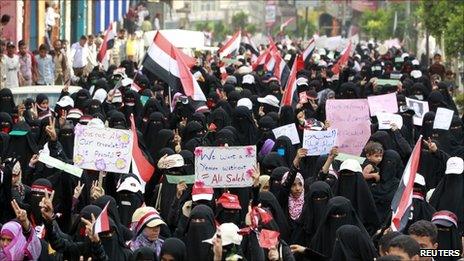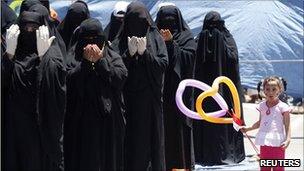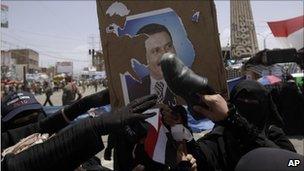Yemen protests: Women take centre stage
- Published

Women march in the southern city in Taiz
When anti-government demonstrations first began in Yemen three months ago, many predicted that they were likely to fail because - unlike Tunisia or Egypt - Yemen would not be able to mobilise half of its population. The sceptics could not have been more wrong.
Seated in her tent in the middle of Sanaa's Change Square, Tawakul Karman, a young woman activist, says she is astonished.
"I could never imagine this," she says. "In Yemen, women are not allowed out of the house after 7pm, now they are sleeping here."

Protesters break for prayers in the capital Sanaa
In the last three months, Mrs Karman has been imprisoned, beaten and humiliated in the state media.
As a result, she is a household name in Yemen and an inspiration to many women here.
"This goes beyond the wildest dream I have ever dreamt," she says. "I am so proud of our women."
The unexpected level of women's participation shows, many believe, the depth of public discontent with the three-decade-long rule of President Ali Abdullah Saleh.
In her flat just a short walk from Change Square, Alia told me she always loved being a full-time mother to her two daughters and never planned on becoming a human rights activist.
But three years ago, her husband Waleed disappeared.
She looked for him for four months, until she finally found him in a jail.
He had been beaten, tortured and accused - unfairly, she says - of links to Shia rebels from the north of the country.
Three years on, Waleed is still waiting for trial. Alia, in the meantime, is campaigning on behalf of not only her husband, but many other political prisoners.
"Ali Abdullah Saleh turned me into a stronger woman," she says with a smile.
Male reaction
What many here find surprising is not the fact that Yemeni women have found strength to defy tradition, it is that many Yemeni men seem to have accepted it.
"I went home last night after being in the square till almost midnight. I was expecting a lecture - but there wasn't one," says Sara, a British Yemeni filmmaker who grew up in Sanaa before moving to the UK.
On this trip back to Yemen, she says, she doesn't recognise her family.
"The family here controls you fully, what you do, how you dress, how you behave in public and in private. And it does not change when you grow up - then you get married and control is passed on to your husband's family. So this change of attitude is astonishing," she says.

President Saleh gets the shoe treatment after his comments about women
"My wife, my daughters, my sisters, we are all here," says one protester, whose entire family now lives in the streets.
"Women have a real place in the Yemeni history and I would even vote for a woman president," he adds.
Yemen's embattled president does not share this enthusiasm for female political participation.
As he addressed a rally of tens of thousands of his mostly male supporters at a highly orchestrated rally recently, Mr Saleh - who the West had praised as a secular leader - shamed the opposition for allowing women to protest with the man.
It was, he said, "un-Islamic".
The irony is that Yemen's Islamist opposition party, Islah, is the biggest force in mobilising women.
Islamic perspective
Hameed al-Ahmar, one of Yemen's most powerful men, says his party understands that the world has changed.
It is time, he says, that the world too understood that "Islam makes plenty of space for women".
"We encourage women, and ladies from Islah are the most active in the country," he says.
Still, he can't resist a joke.
"We love ladies more than others, that's why we have two or three wives," he says with a chuckle.
The joke would not exactly resonate with campaigners for women's rights, and yet analysts in Sanaa say that despite the stereotypical attitudes of some of its male leaders, the Islah Party does offer women more opportunities than any other political movement in Yemen.
In this Gulf Arab country, where child marriage remains one of the biggest violations of women's rights, it was the liberal wing of Islah that initiated legislation to raise the minimum marriageable age to 18 years.
"Women are very active in Islah, they are very active in organising and also in campaigning for women's rights," says Nadwa al-Dawsari, executive director for the Yemen branch of Partners for Democratic Change.
"But I must add that all parties in Yemen, including Islah, use women to cultivate votes," she adds.
Mrs Dawsari says she would like to see more women use the uprising as an opportunity to campaign for their rights.
This revolution-in-the-making is not about women. Their rights are not on its agenda. And yet it has already brought about a massive change.
Every day in Sanaa's Change Square, dozens of women get up on stage and tell tens of thousands of men what they think.
Just three months ago, this was simply unimaginable.
- Published12 April 2011
- Published17 April 2011